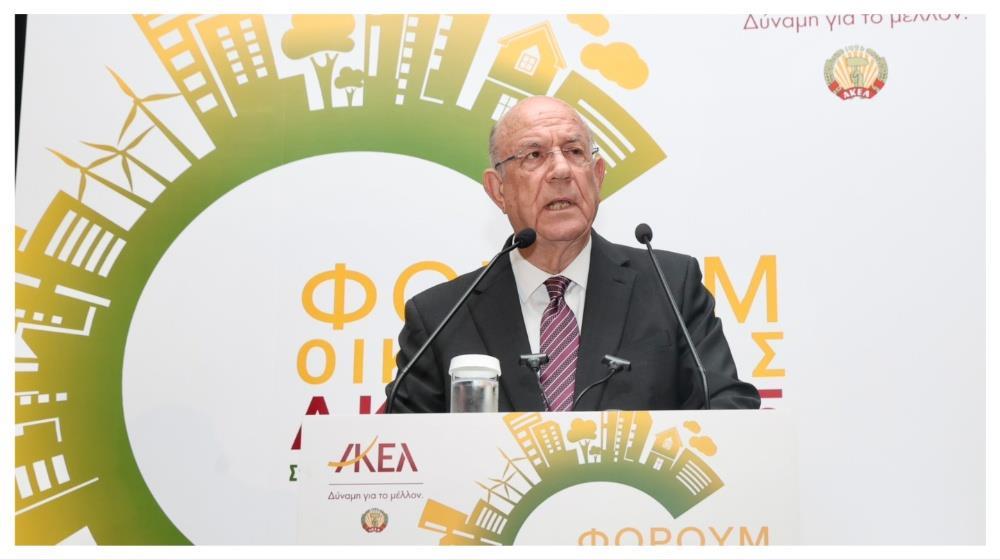The position that the Cypriot economy is entering a period of strong resilience, positive performance, along with a simultaneous need for deep reforms that will enhance the sustainability of the development model was expressed by Makis Keravnos during his address at the AKEL Economic Forum 2025.
The Minister of Finance, presenting the government's key policies, emphasised the connection between economic stability and housing policy, energy security and climate strategy.
Makis Keravnos began his speech by comparing the European and global environment with the course of the Cypriot economy, saying that the international scene is characterised by ongoing geopolitical tensions, economic instability and changing conditions that require immediate adaptation. Within this environment, the Cypriot economy presents a remarkable picture of stability and perspective, he argued.
The Minister then stressed that Cyprus is among the European Union countries with the highest public finance performance, achieving a primary surplus of five percent and a rapid de-escalation of public debt. According to forecasts, the debt will fall below the 60 percent threshold by the end of 2025, earlier than initially planned.
This positive climate, as he characteristically stated, is also reflected in the ratings of international agencies, as Cyprus returned to category A after thirteen years, a fact that strengthens the country's international image and creates a framework of trust for investment and development activity. This stability allows for the promotion of broader reforms and social interventions aimed at improving living standards.
Within this context, the Minister analysed the philosophy of the major tax reform promoted by the government. This is the most significant change in recent decades, aiming at a fairer, more efficient and modern system that responds to the current needs of society and the economy. The reform, as he explained, is directly linked to the issue of housing, energy upgrading and the green transition, offering incentives that support families and encourage the adoption of clean technologies.
Makis Keravnos referred to the provision of tax deductions for interest on loans related to the purchase of a primary residence, energy upgrading of homes and the acquisition of electric vehicles, as well as the support for businesses that invest in sustainable technologies. These interventions, he stressed, strengthen social cohesion, reduce energy costs and accelerate the transition to a greener economic model.
A large part of the speech was dedicated to the issue of housing, which he described as one of the most serious social challenges of our time. The Minister referred extensively to recent European data recording a significant increase in housing costs across the EU. He even presented data showing that in many countries housing costs have skyrocketed, while an average European household spends almost a fifth of its income on housing. In this context, he noted that Cyprus is among the countries with the lowest cost increase in the last decade, with a rate of just over 13 percent.
However, he pointed out that the need for affordable housing remains strong. For this reason, the government has formulated a comprehensive housing strategy based on increasing the housing stock, utilising vacant housing, collaborating with the Cyprus Land Development Corporation and facilitating citizens' access to housing with targeted projects for young people, families and areas with special characteristics. The Minister spoke of the planned production of over one thousand nine hundred new units, many of which will be included in the affordable housing market.
He then turned to the government's climate and energy strategy. The Minister described the climate crisis as the greatest challenge of our time, highlighting the international dimension of the phenomenon and the need for immediate adaptation. He focused in particular on the global calls for investments in clean technologies and mechanisms that will allow limiting temperature increases, while recalling that the European Green Deal is a holistic transformation plan that Cyprus has incorporated into its national planning.
He also presented the actions and investments included in the National Energy and Climate Plan, with a total amount of over three billion euros. Among other things, he referred to projects for the upgrading of homes and businesses, the development of Renewable Energy Sources, the strengthening of the circular economy, recycling, sustainable mobility and the promotion of electromobility. He pointed out that the Photovoltaics for All program, investments in forest ecosystems, the strengthening of water projects and the systematic exploitation of desalination are central elements of a multi-level strategy that aims at a clean, green and resilient Cyprus.
He then referred to the new European framework related to the Social Climate Fund. Based on the European decisions, Cyprus is expected to utilise an amount of approximately one hundred and seventy-four million euros for the period 2026 to 2032, which will be directed to actions to support households and businesses in adapting to the new energy environment. The draft of the national plan has already been put out for public consultation and the Minister expressed the hope that the Forum itself will contribute with proposals.
Concluding his speech, Makis Keravnos emphasised that the government's economic policy is people-centered and balanced, based on fiscal stability, social justice and intergenerational responsibility. The goal is development that creates opportunities for all, protects the environment and ensures that future generations will live in a country of prosperity and prospects.
(Source: InBusinessNews)









